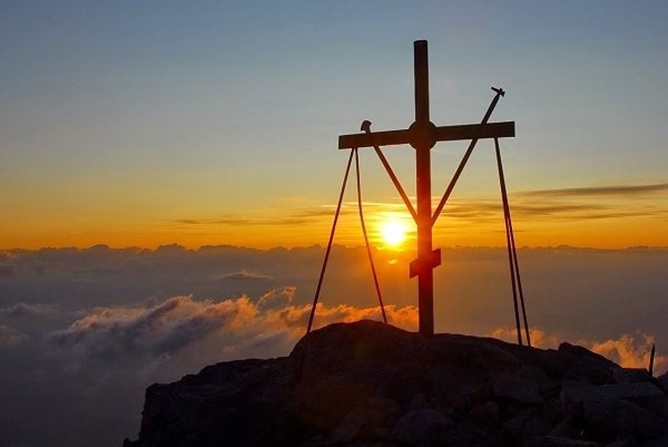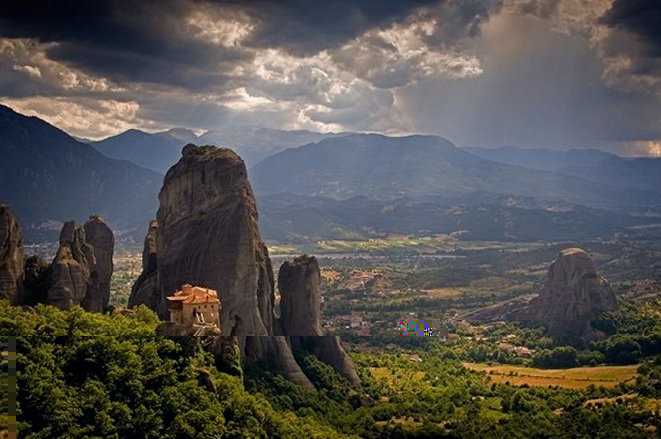Sunday after the Elevation of the Precious Cross
19 September 2022The great feast of the Elevation of the Precious Cross, the most holy symbol of our faith, continues to illumine the spiritual atmosphere of the Church. This is why the Gospel reading for today is concerned with the cross: it refers to Christ saying that those who wish to follow him must take up their cross and follow him. Saint Mark the Evangelist places these words of Christ, this exhortation to take up our cross upon our shoulders, immediately before the event of the Lord’s transfiguration. Shortly before Christ revealed his divinity through the transfiguration, he disclosed the theology of the cross.
The Lord says that those who wish to follow him should take their cross upon their shoulders and then follow him and find eternal life. He delivers this message having taken up his own cross and ascended dread Golgotha in order to give everything for our salvation and to bestow the resurrection on us. ‘Take up your own cross on your shoulders and deny yourself. If you want to save your life by avoiding death for my sake, then you’ll lose eternal life. But if you sacrifice your life for my sake, you’ll gain it’, says the Lord.

What’s the reason why the Lord’s so adamant and states at the outset such harsh terms, you might say, which could, perhaps, discourage people from following him?
The answer is that the Lord requires such great sacrifices because he’s inviting people to accomplish something unimaginably great: the acquisition of heaven, of eternity. In other words, something infinitely more precious than the whole of the universe. If people expend effort and expose themselves to terrible dangers in order to gain some money, to earn a degree, to find a position, is it too much to ask them to make commensurate efforts in order to gain the inconceivable gift of the divine kingdom?
What does it mean to deny ourselves? We deny our former self, the person of the passions, of earthly and base concerns. If we reach the point of denying our former, sinful self then we’re worthy of following our crucified Lord. This is a difficult path. It requires effort, sacrifices and sweat. We take up the cross onto our shoulders at the hour of our baptism and our induction as members of the holy Church. ‘Denying yourself’ is the equivalent of necrosis before death. Your body of sin has to be mortified, your former self has to be eradicated so that the new person, created to be like God, can arise. It’s not possible to follow Christ and, at the same time, to pursue the pleasures of this vacuous world. Denial of the self means humbling yourself for the sake of love for others. We’re called upon to deny the world, as well. The world stands between the soul of each of us and the cross, but not the world in the sense of all the beauty which the Lord made. Christ calls upon those who wish to follow him to take up their cross. The cross shouldered by all the faithful children of God is a heavy burden. It’s similar to that of Christ. But the pain of the crucifixion is followed by the glory of the resurrection.
The Lord also reveals the worth beyond price of our soul with an apposite question: what would it benefit anybody if they gained the whole world but damaged their soul; what could we possibly give in exchange for our soul? (Matth. 16, 26). His answer is that there’s absolutely nothing of commensurate value to the soul of each one of us.

Even for the eyes of the body, the shape of Christ’s cross is a harsh arena. But for the disciple and follower of Christ, it’s the contest which gives the greatest possible spiritual pleasure. This enjoyment is so great that sorrow is completely drowned and Christ’s followers feel only joy in the most severe of trials, according to Saint Ignatij Brianchaninov.
The cross means that we look down, engage and act from the heights of love. The cross means forgiveness, understanding, the resurrection of the soul and the mortification of the ego. Those who take up their cross don’t deny their self, but abandon what makes that self sick unto death, that is, egotism.
The more the whole person desires God, the more they truly strive to cast off their self and follow Christ, to take up their cross, the cross of the Lord. They will then receive divine power from Jesus Christ, says Saint Justin Popović.
Let us pray that Christ’s precious and life-giving cross, the universal elevation of which we’ve just celebrated, will bless us and sanctify our lives and that its power will never leave us.






